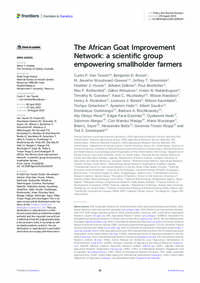The African Goat Improvement Network: a scientific group empowering smallholder farmers

Authors:
The African Goat Improvement Network (AGIN) is a collaborative group of scientists focused on genetic improvement of goats in small holder communities across the African continent. The group emerged from a series of workshops focused on enhancing goat productivity and sustainability. Discussions began in 2011 at the inaugural workshop held in Nairobi, Kenya. The goals of this diverse group were to: improve indigenous goat production in Africa; characterize existing goat populations and to facilitate germplasm preservation where appropriate; and to genomic approaches to better understand adaptation. The long-term goal was to develop cost-effective strategies to apply genomics to improve productivity of small holder farmers without sacrificing adaptation. Genome-wide information on genetic variation enabled genetic diversity studies, facilitated improved germplasm preservation decisions, and provided information necessary to initiate large scale genetic improvement programs. These improvements were partially implemented through a series of community-based breeding programs that engaged and empowered local small farmers, especially women, to promote sustainability of the production system. As with many international collaborative efforts, the AGIN work serves as a platform for human capacity development. This paper chronicles the evolution of the collaborative approach leading to the current AGIN organization and describes how it builds capacity for sustained research and development long after the initial program funds are gone. It is unique in its effectiveness for simultaneous, multi-level capacity building for researchers, students, farmers and communities, and local and regional government officials. The positive impact of AGIN capacity building has been felt by participants from developing, as well as developed country partners.
